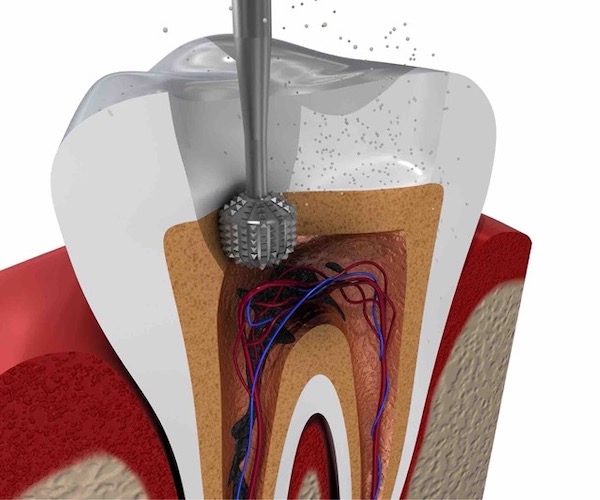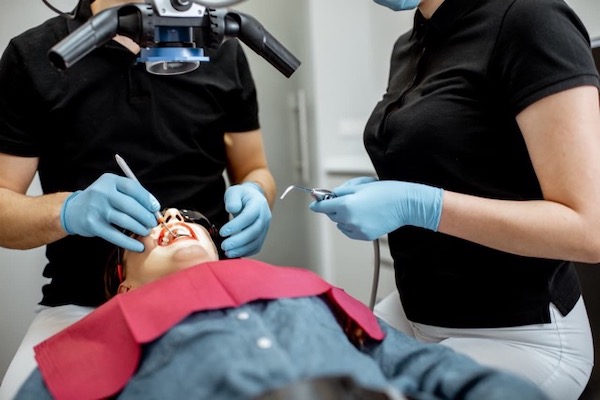How Painful is a Root Canal?

Root canals are common dental procedures used by dentists to save severely decayed or damaged teeth. While over 15 million Americans undergo root canal treatments every year, many patients shudder at the thought of this procedure. Root canals have incurred a bad reputation for being painful and uncomfortable. However, most patients are pleasantly surprised at the ease of this treatment. Thanks to many advancements in dental care and technology, root canals are a relatively quick and overall pain free experience for most patients.
Have a Look at
Inflamed roots can cause severe tooth pain
While the sound of a root canal treatment can be scary, root canals are most often used to relieve tooth pain. When a tooth becomes infected or abscessed, a severe toothache is often the first and most prominent sign. If you have an infected tooth, you may notice a deep persistent pain that can impact your ability to eat and speak. It can move from your tooth into your jaw, causing a discomfort that cannot be ignored. When you bite down on the infected tooth, it is likely that it will hurt badly. If you are experiencing this type of tooth pain, it is important to talk to your dentist as soon as possible before the condition of the tooth worsens. The reality is, if your tooth has become infected, the pain will not go away on its own.
In the weeks leading up to your procedure, your dentist may prescribe you with antibiotics to take care of any infections and reduce swelling before performing the root canal. This will make the tooth less painful to the touch.
Have a Look at
Local anesthesia is used to prevent pain during root canal procedures

Before your root canal treatment, your dentist will use a local anesthesia to numb the gums and tissue surrounding the infected tooth. In many cases, a topical anesthesia can also be used to make the process even more comfortable. Once the area has been numbed, you shouldn’t feel any pain over the course of the root canal procedure.
Your dentist will check to make sure that the area has been properly frozen. In the event that you do feel pain during your treatment, let your dentist know right away. You should not feel any pain during your root canal and may require more anesthesia to further numb the area.
Next, a small incision is made in the tooth so that the infected pulp and tissue can be removed. The tooth is then filled and sealed to complete the procedure. You may experience a small amount of pressure as the inside of your tooth is being cleaned.
What Are You Waiting For...
MAKE AN APPOINTMENT
Have a Look at
Root canals treat dental and facial pain
Discomfort during your root canal treatment is comparable to having a deep cavity filled. While you may experience some mild discomfort, root canals can save your tooth from having to be extracted. Many patients find that once the infected tissue has been removed from their tooth, they feel much better than they did prior to their root canal procedure!
Have a Look at
Mild discomfort is common following a root canal
Patients can expect to feel some tenderness for a few days following their root canal procedure. If the tooth in question was badly infected prior to the treatment, it may take some time for your immune system to take care of the remaining infected tissue. Sensitivity following a root canal can be managed with over-the-counter pain medications like ibuprofen or acetaminophen.
During your recovery, eating soft foods and avoiding chewing on the recently treated tooth can help ensure a smooth recovery. Your dentist will provide you with aftercare instructions to make the days following your procedure as comfortable as possible.
Any discomfort caused by a root canal should decrease over time, lasting no more than a few days. If you have prolonged or significant pain after your root canal, call your dentist right away.
If you are experiencing tooth pain in the Los Angeles area, Dr. Nik and the team at LA Dental Experts can help. Get in touch with us to book a consultation!
What Are You Waiting For...
MAKE AN APPOINTMENT
DISCLAIMER
This Website Does Not Provide Medical or Dental Advice
The information provided on this website are for informational purposes only. It is not intended to be a substitute for neither professional dental and medical advice nor medical diagnosis and treatment. Always seek the advice of your dentist and physician or other qualified healthcare providers with any questions you may have regarding a medical condition or treatment and before undertaking a new health care regimen.
Accessibility: If your vision is impaired or you have other impairments covered by the Americans with Disability Act, and you would like to discuss possible accommodations in regards to using this website, please contact us.
Copyright © 2024 LA Dental Experts
